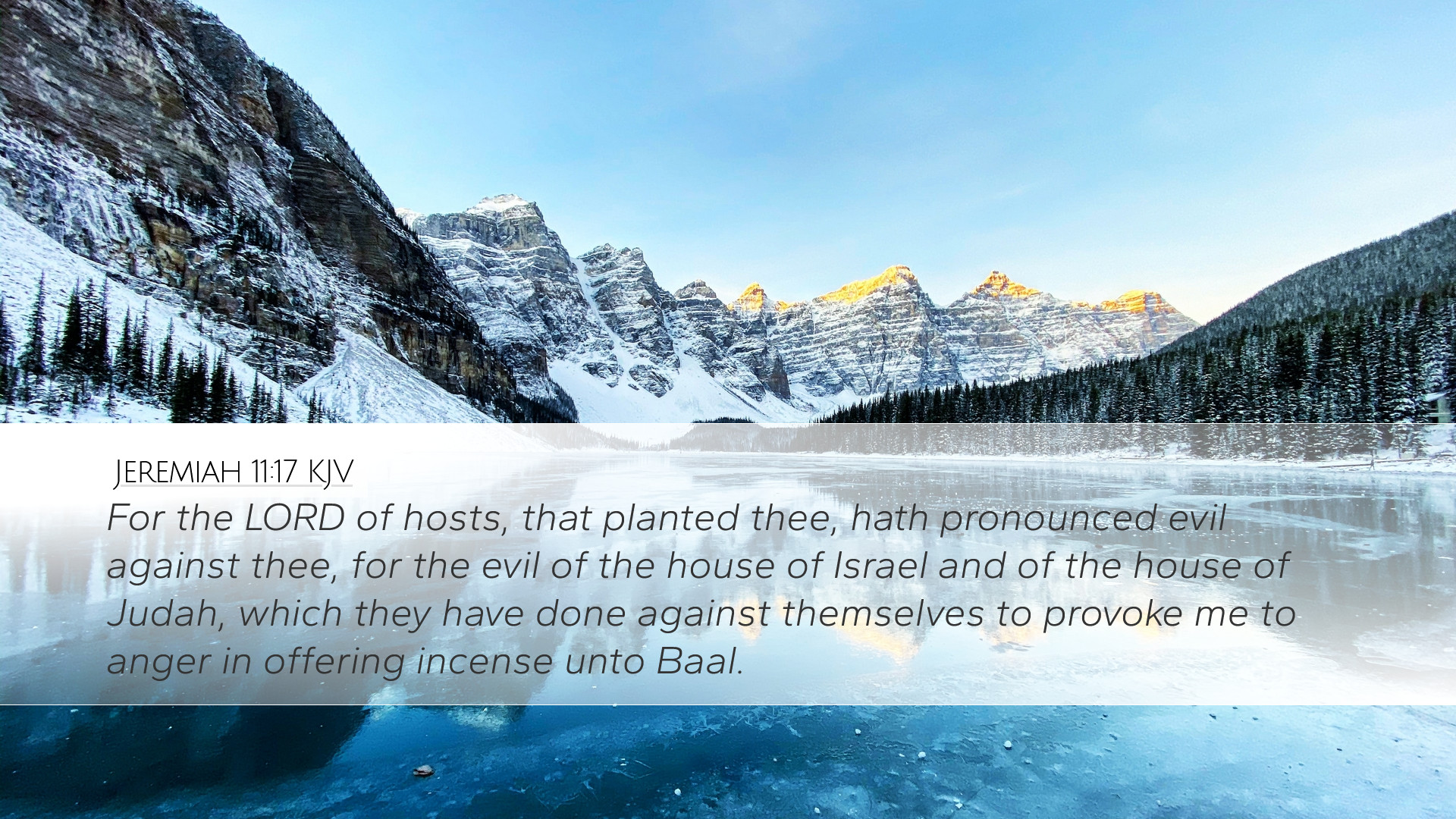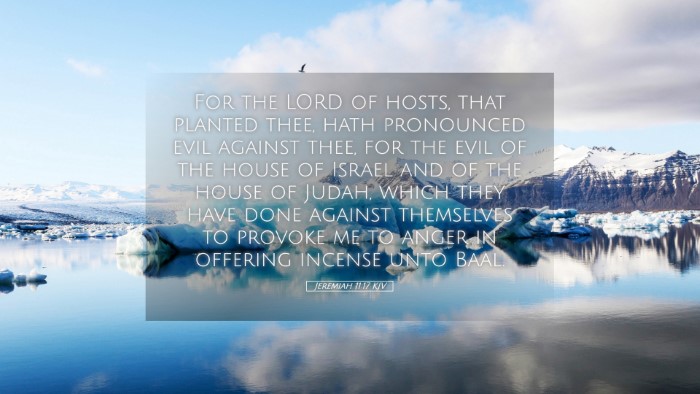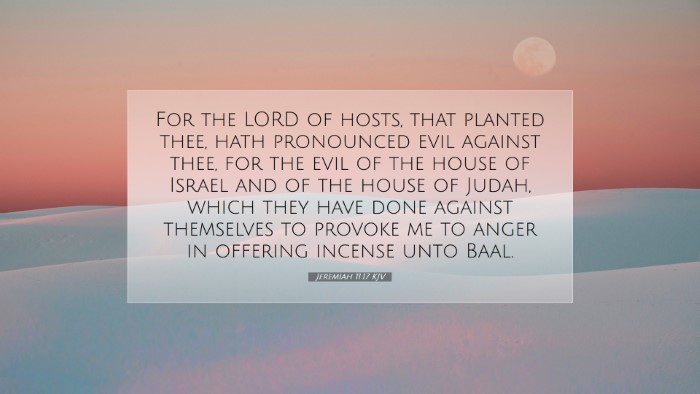Commentary on Jeremiah 11:17
Verse: "For the Lord of hosts, who planted thee, hath pronounced evil against thee, for the evil of the house of Israel and of the house of Judah, which they have done against themselves to provoke me to anger in offering incense unto Baal."
Introduction
This verse serves as a critical junction in the prophetic discourse of Jeremiah, illustrating God's deep-seated concern over Israel's idolatry and moral decline. It encapsulates a pivotal theological theme within the prophetic literature—God's covenant faithfulness juxtaposed with human unfaithfulness. The commentaries from Matthew Henry, Albert Barnes, and Adam Clarke illuminate different facets of this verse, enriching our understanding for pastors, students, and theologians alike.
Contextual Background
Jeremiah prophesied during a tumultuous period characterized by spiritual decay within Israel and Judah. This verse reflects God's response to Israel's persistent disobedience, specifically their inclination towards idol worship. The mention of Baal signifies a departure from covenant fidelity. Understanding this backdrop is essential for grasping the severity of the warning communicated in this verse.
Matthew Henry's Insight
Matthew Henry emphasizes the profundity of God's displeasure with His chosen people. He notes, "God had planted them as a vine, with every intention for their growth and prosperity, but their subsequent actions—offering incense to Baal—compelled Him to pronounce judgment." Henry suggests that Israel's sins are self-destructive, indicating a covenant that is inherently tied to both blessings and cursings—blessings for obedience and curses for disobedience.
Moreover, his commentary draws attention to the idea that the evils pronounced against them were not mere arbitrary acts of divine retribution but rather consequences stemming from their own choices. He underscores the gravity of inciting God's anger through idolatry, offering a stark warning against any deviations from the faithfulness required by God.
Albert Barnes' Analysis
In his analysis, Albert Barnes provides a thorough examination of the phrase "the Lord of hosts, who planted thee." He articulates that this metaphor highlights God's role as both the creator and sustainer of Israel: "As a gardener tends to his plants, so the Lord has cultivated Israel to bear fruit in righteousness." Barnes interprets the act of offering incense to Baal as a betrayal of God's trust and a grievous affront to His sovereignty.
Barnes further expounds on the terms “evil” and “provoke me to anger,” elucidating that God's declarations are warnings meant to call His people back to Himself. He contends that God's purpose is redemptive, finding expression even in judgment, and serves as a rallying call for repentance and return to true worship.
Adam Clarke's Perspective
Adam Clarke's commentary presents an intricate exploration of the implications of Israel's idolatry. He states, "The house of Israel and the house of Judah represent not only the nation but the spiritual condition of their leaders and people." Clarke perceives the idolatry as symptomatic of deeper issues within the people's hearts, suggesting that their worship of Baal was indicative of a systemic spiritual malaise.
Clarke also delves into the phrase “offering incense unto Baal,” connecting it to the broader theme of misplaced devotion. He argues that the danger of idolatry lies not only in the act itself but in the vertical disconnection from God it represents, urging scholars and church leaders to examine contemporary parallels in their ministries.
Theological Themes
- Covenant Faithfulness: The verse exemplifies the importance of obedience to God's covenant, serving as a reminder of the consequences of turning away from divine statutes.
- The Nature of Idolatry: It reveals that idol worship is a profound betrayal of God’s love and purpose, underscoring its contemporary relevance in various forms.
- Divine Judgment: God's judgments are not arbitrary but are rooted in a desire to redirect His people towards righteousness and restoration.
Application for Pastors and Theologians
The lessons from Jeremiah 11:17 resonate deeply within church leadership and teaching spheres. Pastors are called to cultivate a community rooted in worship that honors God and resists the allure of contemporary idols, whether they be materialism, secularism, or other distractions. Moreover, they must embrace the duality of God’s nature as both redeemer and judge, preaching a message of hope that still recognizes the need for repentance and humility before the Almighty.
Theological scholars must contemplate the implications of covenantal faithfulness in the context of modern Christianity, drawing parallels between ancient Israel and today's spiritual environments. This insight fosters deeper engagement with the text and encourages commitment to the original intentions of God’s commandments.
Conclusion
Jeremiah 11:17 offers a poignant reminder of the perils of disobedience and the heart of God, who seeks to protect and shepherd His people toward righteousness. As we reflect on this verse, may we be compelled to assess our own lives and the life of the church in light of God's call for faithfulness. The insights drawn from public domain commentaries enrich our understanding, pushing us toward a deeper relationship with the Lord who longs for our devotion and obedience.


